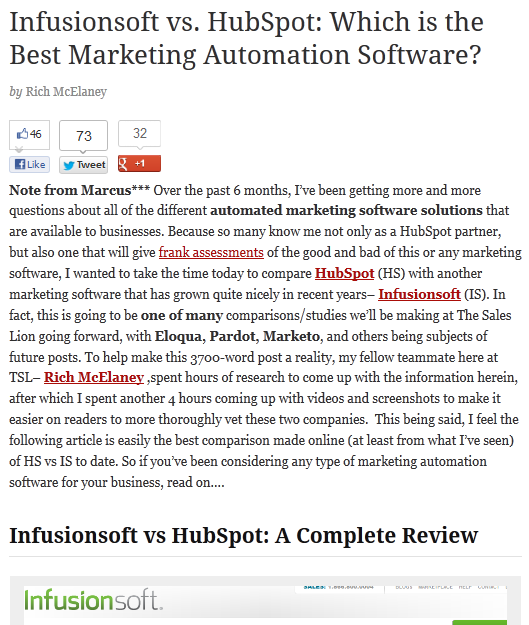Topics:
Content MarketingSubscribe now and get the latest podcast releases delivered straight to your inbox.
Goodbye SEO, Hello SCM: The Rise of Search Content Marketing

Feb 21, 2013

Rand Fishkin once said, “Delivering an exceptional experience and building a true web brand are now essential to long-term SEO success.”
Something tells me Rand was right ;-)
Something also tells me it’s time we moved to the next phase of SEO—one that manages to maintain best SEO practices post penguin/panda, but also delivers an exceptional experience through great content.
This is exactly why I feel Search Content Marketing (SCM)—the morphology of two digital marketing essentials—is a needed vernacular shift in this industry, as it better describes what some SEOs and content marketing companies are now (or at least should be) doing.
This Isn't About Acronyms
Recently, while speaking at a conference in Dallas, a Wordpress developer who was in the audience gave me one of the nicest compliments I’ve ever received. After my 1-hour talk, the gentleman came up to me and made a very simple statement:
“That was the best presentation on SEO I’ve ever seen.”
I don’t mention this compliment from the gentleman to brag, but rather to make a point—during my entire time speaking to this group of people, I never mentioned the phrase “SEO” or “search engine optimization” one single time. Rather, I simply discussed the power of thinking like a consumer, being willing to address every single question they have on our website, and then using those questions to create a long tail keyword campaign that generates traffic, leads, and sales.
When I consider the essence of search content marketing, I see a fundamental belief in 3 things:
1. SEO is not the devil: That’s right, it’s not. Sure, there have been a lot of black hat digital scumbags that have done naughty things in the past to game the system, but SEO itself is not the enemy. Nor is it bad. How else are the search engines going to show their customers (you and me) great, relevant, and specific search results? This is also why anyone that says, “Don’t ever pay attention to SEO,” is a fool and needs to be shown the door, in my opinion :-)
Believe it or not, there are many "content marketers" out there right now that don't pay attention to SEO, and really don't even mention it to their clients when they are planning, analyzing, and executing a content marketing plan. I find this a bad practice, and it's one of the reasons I think search content marketing needs to be another component of this conversation.
2. Content that doesn’t ever get read is essentially a failure: Let me ask you a question: If someone writes an article, and it never gets read, was it ever written in the first place?? Like the tree in the forest that didn’t fall because no one heard it, I say this because content, without readers, simply does not move the needle for a business.
For a huge portion of businesses out there, the main way their content gets read is through search engine inquiries. Yes, of course direct referrals, advertising, email, social media, and assignment selling play a big role in traffic generation as well, but organic search results are still the gatekeeper for a large majority of businesses.
3. Quality will be the most important aspect of digital content moving forward: Not that it needs be perfect, but with more and more industries becoming incredibly saturated in content, quality is and will always be the great divide between the masses of "producers" versus the few that are able to rise to the top.
Examples of Great Content Marketing Combined with SEO
This being said, I want to show you examples of what I think search content marketing is all about:
Why it Rocks from a Content Marketing Standpoint: This post was a doozy. It took over 10 hours to prepare (thanks Rich!) and was drafted multiple times. With 3,000 words, readers finally are able to see an in-depth review of two companies that are a constant topic of debate for many small businesses around the globe looking to jump into the automated marketing software arena. In many ways, this post embodies everything Fishkin was speaking of in his opening statement of this post-- delivering an exceptional user experience.
Why it Rocks from an SEO standpoint: I’ve said it before and I’ll say it a million more times: “Versus” posts work. Readers love them. Search engines love them. And few companies have the guts to write them. But, if you do have guts, then you get search engine ranking results like you see in the image above.
Why it Rocks from a Content Marketing Standpoint: I’m biased when it comes to the folks at Block Imaging, mainly because they were one of my first clients and have one of the best Chief Content Officers in the world in Krista Kotrla, but their company brand continues to skyrocket because they aren’t afraid to address questions consumers have—like cost and price—something that most companies are scared to death of and won’t do. Furthermore, this article is a great example of allowing visitors to consume information in a manner that suits them best, be it text or the embedded video from the company’s president, Josh Block.
Why it Rocks from a SEO Standpoint: Google “MRI Machine Cost” or “Price of MRI Machine” and you’ll quickly see why it rocks, and why it’s generates tons of traffic, leads, and sales for the company.
 If you read Convince and Convert often, you'll see someone that always merges best SEO practices with incredible content.
If you read Convince and Convert often, you'll see someone that always merges best SEO practices with incredible content.
Why it Rocks from a Content Marketing Standpoint: Few people are better online at search content marketing than Jay Baer. What’s interesting about Jay is that although he doesn’t talk about SEO very much, it runs through the guy’s veins, as is evident if you look at many of his blog titles. That being said, this article was powerful because it answered, and in a very clear, concise, and thoughtful manner, a question that bloggers, businesses, and marketers have all over the world, “How do you calculate the ROI of blogging?”
If you read this article, you’ll see why Jay is such a respected teacher, speaker, and thought-leader in this field, as he embodies the essence of great content marketing.
Why it Rocks from an SEO Standpoint: Was Jay trying to be witty with that title? Nope, not at all. He went after a perfect long tail keyword phrase and scored an immediate touchdown. Just Google “calculate blogging ROI” to see what I’m talking about.
 By simply thinking like your customer and answering their questions, you will have a great mix of content marketing and SEO, just as Segue Technologies shows in this post.
By simply thinking like your customer and answering their questions, you will have a great mix of content marketing and SEO, just as Segue Technologies shows in this post.
Why it Rocks from a Content Marketing Standpoint: One of my newest clients, Segue Technologies, specializes in developing mobile apps for a variety of businesses and needs. Knowing they are constantly asked about app compatibility with iOS, they wrote an excellent article addressing this common customer question—an article that can now be a part of their sales process going forward.
Why it Rocks from an SEO Standpoint: Although the long tail phrase that is this blog title might not be a prolific one in terms of the number of monthly searches it gets, it is certainly a question that companies are asking when going through the app development process. And because no other app developer has addressed this question so well, Segue ranks #1 on Google for the phrase.
Going Forward
I could literally go on and on showing examples of individuals and companies that are doing a great job combining SEO and content marketing, but I think you get my point.
Please understand with this post I'm not saying we should change the phrase "content marketing," as content marketing is way more than writing blog articles and producing videos that are well optimized, as you can read in this article here.
But I am saying I think we need to start the process of changing the world's mentality towards SEO. This starts with SEO companies integrating content marketing into the mix and helping their clients understand the days of keyword stuffing, silly URLs, and crappy inbound links schemes are quickly coming to a close and no longer have value. This doesn't mean they forget their SEO roots and best practices, it just means they refine the old while embracing the new.
And the new, at least in my opinion, is Search Content Marketing.
Your Turn:
I would imagine many folks will disagree with this article, which is fine. That is why TSL is known to have one of the best comment sections on the entire web. Respectful disagreement is welcome in these parts.
That being said, do you feel SEO needs to evolve into SCM? Do you think I'm a fool for making such a suggestion? Jump in folks, it's your turn to say what's on your mind. :-)


Order Your Copy of Marcus Sheridan's New Book — Endless Customers!


